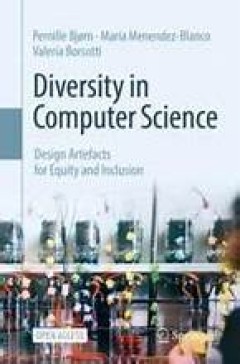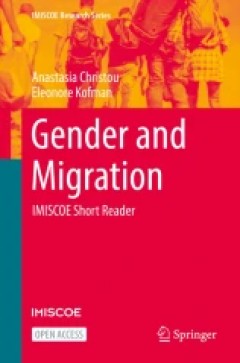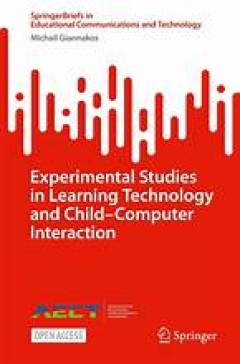Filter by

Die Prämedikationsambulanz
In diesem Open-Access-Buch beschäftigt sich der Universitätsmediziner, Manager und Gesundheitswissenschaftler Sandro Lorenz mit der Zufriedenheit von Patientinnen und Patienten in der Prämedikationsambulanz einer großen deutschen Universitätsklinik. Ein zusätzlicher Fokus liegt auf der präoperativen Angst im Vorfeld einer Narkose bzw. Operation. Der Autor plädiert dafür, dass diese zun…
- Edition
- 1
- ISBN/ISSN
- 978-3-658-39259-8
- Collation
- -
- Series Title
- -
- Call Number
- XXIV, 257

Diversity in Computer Science
This is an open access book that covers the complete set of experiences and results of the FemTech.dk research which we have had conducted between 2016-2021 – from initiate idea to societal communication. Diversity in Computer Science: Design Artefacts for Equity and Inclusion presents and documents the principles, results, and learnings behind the research initiative FemTech.dk, which was …
- Edition
- 1
- ISBN/ISSN
- 978-3-031-13314-5
- Collation
- -
- Series Title
- -
- Call Number
- XIX, 122

Mathematisches Problemlösen in der Studieneingangsphase
Dieses Open-Access-Buch beschreibt die theoriebasierte Entwicklung einer semesterbegleitenden Maßnahme zur Förderung der Problemlösekompetenz von Studienanfänger:innen der Fachmathematik und des gymnasialen Lehramts, sowie die zyklische Modifikation dieser Maßnahme im Sinne der Entwicklungsforschung. Begleitend dazu wurden, mit dem Ziel, grundlegende Erkenntnisse zum studentischen Probleml…
- Edition
- 1
- ISBN/ISSN
- 978-3-658-39052-5
- Collation
- -
- Series Title
- Essener Beiträge zur Mathematikdidaktik
- Call Number
- XIII, 231

Italian National Forest Inventory—Methods and Results of the Third Survey
This open access book deals with the methods and the results of the third Italian national forest inventory (INFC2015). Arma dei Carabinieri is entrusted with the realisation of the National Forest Inventory and with the decisions about the aims of the survey and data treatment. National forest inventories produce statistically based information on forests over country areas. Such information i…
- Edition
- 1
- ISBN/ISSN
- 978-3-030-98678-0
- Collation
- -
- Series Title
- Springer Tracts in Civil Engineering
- Call Number
- XXXII, 576

Gender and Migration
Anastasia Christou is Associate Professor of Sociology, member of the Social Policy Research Centre and founding member of the FemGenSex research network at Middlesex University, London, UK. Anastasia has engaged in multi-sited, multi-method and comparative ethnographic research in the United States, the UK, Denmark, Germany, Greece, Cyprus, France, Iceland and recently in Switzerland. Anastasi…
- Edition
- -
- ISBN/ISSN
- 978-3-030-91971-9
- Collation
- -
- Series Title
- -
- Call Number
- -

Transformation Literacy
etra Künkel is an executive board member of the International Club of Rome and the founder of the Collective Leadership Institute, a Germany, USA and South Africa-based social enterprise building collaboration competency for transformative change towards world sustainability. As a seasoned systems psychologist, visionary author and expert in complex multi-stakeholder settings, she promotes sys…
- Edition
- -
- ISBN/ISSN
- 978-3-030-93254-1
- Collation
- -
- Series Title
- -
- Call Number
- -

Towards Responsible Plant Data Linkage: Data Challenges for Agricultural Rese…
This open access book provides the first systematic overview of existing challenges and opportunities for responsible data linkage, and a cutting-edge assessment of which steps need to be taken to ensure that plant data are ethically shared and used for the benefit of ensuring global food security – one of the UN’s Sustainable Development Goals. The volume focuses on the contemporary contou…
- Edition
- 1
- ISBN/ISSN
- 978-3-031-13276-6
- Collation
- -
- Series Title
- -
- Call Number
- XIX, 317
Data Parallel C++: Mastering DPC++ for Programming of Heterogeneous Systems u…
Learn how to accelerate C++ programs using data parallelism. This open access book enables C++ programmers to be at the forefront of this exciting and important new development that is helping to push computing to new levels. It is full of practical advice, detailed explanations, and code examples to illustrate key topics. Data parallelism in C++ enables access to parallel resources in a mo…
- Edition
- -
- ISBN/ISSN
- 978-1-4842-5573-5
- Collation
- -
- Series Title
- -
- Call Number
- -

Experimental Studies in Learning Technology and Child–Computer Interaction
This book is about the ways in which experiments can be employed in the context of research on learning technologies and child–computer interaction (CCI). It is directed at researchers, supporting them to employ experimental studies while increasing their quality and rigor. The book provides a complete and comprehensive description on how to design, implement, and report experiments, with a f…
- Edition
- 1
- ISBN/ISSN
- 978-3-031-14350-2
- Collation
- -
- Series Title
- 7 b/w illustrations, 37 illustrations in colour
- Call Number
- XVIII, 107

London clubs, their history & treasures
- Edition
- -
- ISBN/ISSN
- -
- Collation
- 2 v. 23 cm
- Series Title
- 1
- Call Number
- -
- Edition
- -
- ISBN/ISSN
- -
- Collation
- 2 v. 23 cm
- Series Title
- 1
- Call Number
- -
 Computer Science, Information & General Works
Computer Science, Information & General Works  Philosophy & Psychology
Philosophy & Psychology  Religion
Religion  Social Sciences
Social Sciences  Language
Language  Pure Science
Pure Science  Applied Sciences
Applied Sciences  Art & Recreation
Art & Recreation  Literature
Literature  History & Geography
History & Geography